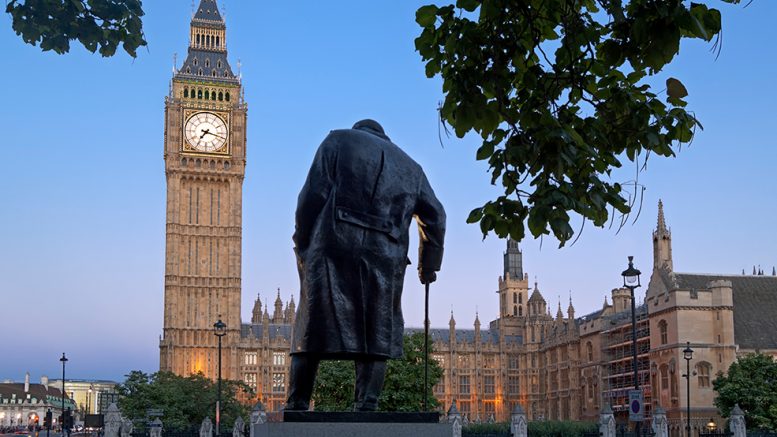Quite apart from being exactly the stoical leader we needed during WWII, Winston Churchill was surely the most quotable politician in history. His exhortations relating to the six-year conflict are legendary but Churchill also had some pithy observations about business.
“Some see private enterprise as a predatory target to be shot, others as a cow to be milked, but few are those who see it as a sturdy horse pulling the wagon,” Churchill told Parliament. On taxation, he argued that: “For a nation to tax itself into prosperity is like a man standing in a bucket and trying to lift himself up by the handle.”
Churchill could draw on a long list of dubious business laws, and we recently celebrated the 450th anniversary of a British classic.
The third parliament of Queen Elizabeth I (convened after an interval of eight years) was held in April-May 1571. The monarch, worried that the assembly would discuss the royal succession, instructed parliament to “meddle with noe matters of state but such as should be propounded unto them, and to occupy themselves in other matters concerninge the commen wealth.” (Spellings were correct in the 16th century.)
In addition to demonstrating how much the English language has changed in 450 years (assuming the Queen could spell), the parliament of 1571 enacted one of the strangest statutes ever seen in the U.K.
The Cappers Act required all males (except noblemen, naturally) over the age of six to wear a woollen cap on Sundays and during holidays (or face a hefty fine). In those days, the wool trade was the foundation of the English economy, and the Tudors were determined to protect it (foreign hats had been banned 83 years earlier).
The Act was ineffective, and widely ignored (although William Shakespeare’s uncle was fined in 1583 for attending church in a hat, rather than a woollen cap), but the legislation wasn’t repealed until 1604.
At the time we were being forced to wear woollen caps, mining opportunities were opening up for Europeans in the Americas. In 1594, Shakespeare wrote of the New World’s “rubies, carbuncles, sapphires,” and how the Americas were “declining their rich aspect to the hot breath of Spain” (Comedy of Errors; Act III, Scene II).

Chile President Sebastian Pinera speaking to the media in July 2019. Credit: Government of Chile.
In 1520, while attempting to circumnavigate the globe, Ferdinand Magellan had become the first European to set foot on what is now Chile. The next Europeans to reach Chile were Diego de Almagro and his band of Spanish conquistadors, who came from Peru in 1535 seeking gold. The soldiers called themselves “men of Chilli,” taking the name from the indigenous Mapuche word for ‘where the land ends.’
The conquest of Chile began in earnest in 1540 and was led by Pedro de Valdivia, who founded the city of Santiago. Although the Spanish did not find the extensive gold and silver they sought, they recognised the agricultural potential of Chile’s central valley, and the country became part of the Spanish Empire.
Some 480 years later, Chile ranks high in the United Nations’ Human Development Index, and is among the most economically, politically and socially stable nations in South America. It leads the region’s rankings of competitiveness, per capita income, economic freedom and perception of corruption. It also has the lowest homicide rate in the whole of the Americas after Canada.
Much can be attributed to the mining industry. Chile’s favourable geology and supportive permitting and fiscal rules have helped the country become the world’s dominant copper miner. In contrast, the volatile and unorthodox politics across the border in Argentina have led to limited development of the vast mineral wealth.
Strange then that this success is being put at risk by government plans to add a 3% tax on sales of copper and lithium over production of 12,000 and 50,000 tonnes per year, respectively. If the bill becomes law, miners will also have to pay a progressive tax on copper sales depending on the metal’s market price.
Mining companies have queued up to complain. The head of BHP’s operations in the Americas said the increased taxes and royalties “risk damaging the mining industry in Chile.” RBC analysts warned that the tax proposal could halve Antofagasta’s net asset value, and Lundin Mining is reported to be holding off on new investments in Chile because of the heightened country risk, while looking to move forward with a huge spend in Argentina.
The CEO of Teck Resources has been more sanguine, noting that tax stability agreements between mining companies and the government are designed to be non-negotiable. He expects them to be respected if changes are made to the country’s royalty system.
While the bill is unlikely to pass in its current form (especially now that Chile’s lower house of Congress has rejected the proposals), analysts believe higher taxes and royalties are coming.
Chile is also planning to rewrite its constitution. In mid-May, Chilean assets plunged after the ruling coalition suffered a surprise defeat in the election for a constituent assembly, putting the writing of a new constitution in the hands of left-wing parties.
Chile needs to take care of its mining sector. The country has been highly successful in attracting exploration and development dollars, but financiers are risk averse and have already started looking elsewhere. Chile has a population of almost 20 million and, with apologies to Churchill, never was so much owed by so many to so few.
— Dr. Chris Hinde is a mining engineer and the director of Pick and Pen Ltd., a U.K.-based consulting firm he set up in 2018 specializing in mining industry trends. He previously worked for S&P Global Market Intelligence’s Metals and Mining division.


Be the first to comment on "The View from England: Churchill had tax advice for Chile"